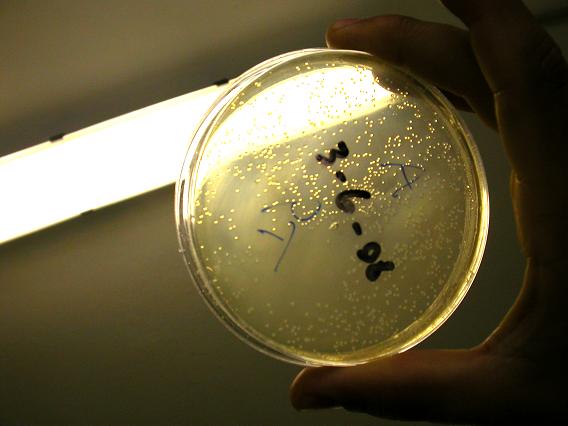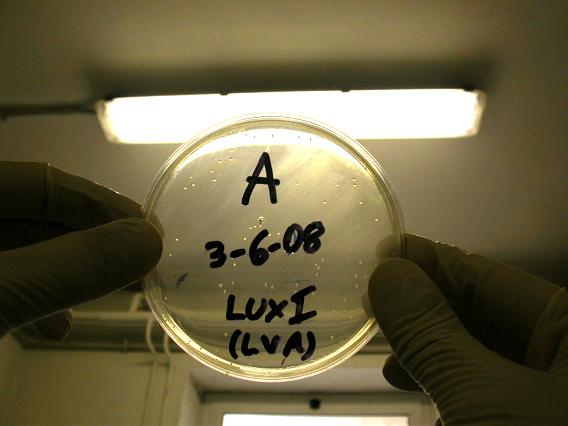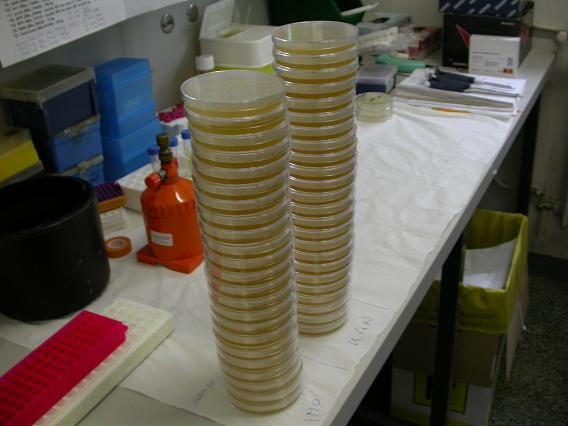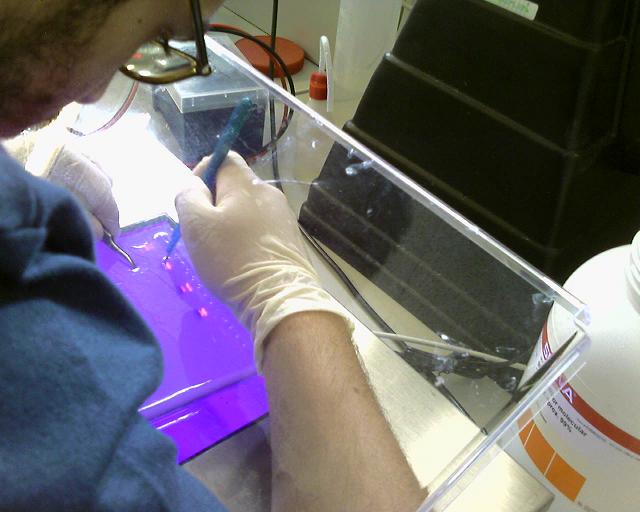Team:UNIPV-Pavia/Notebook/Week3
From 2008.igem.org
(Difference between revisions)
| Line 263: | Line 263: | ||
**In opened plasmids the sites to cut are very near (about 15 bp), while in excided fragments sites are spaced by the BioBrick; for this reason, our digestion protocol to open plasmids was different from the protocol to excide fragments (read Protocols section for details). | **In opened plasmids the sites to cut are very near (about 15 bp), while in excided fragments sites are spaced by the BioBrick; for this reason, our digestion protocol to open plasmids was different from the protocol to excide fragments (read Protocols section for details). | ||
**We supposed there was something wrong with digestion protocol to open plasmids, so we decided to perform plasmid digestion again for our 4 plasmids to open, using excided fragments protocol. | **We supposed there was something wrong with digestion protocol to open plasmids, so we decided to perform plasmid digestion again for our 4 plasmids to open, using excided fragments protocol. | ||
| - | **We also noticed that digestion protocol for excided fragments worked very well for BBa_B0030, whose fragment length is 15 bp, so we | + | **We also noticed that digestion protocol for excided fragments worked very well for BBa_B0030, whose fragment length is 15 bp, so we hoped that this protocol might actually work to open plasmids. |
<br><br> | <br><br> | ||
Revision as of 10:24, 8 June 2008
Notebook
| Week 1 | Week 2 | Week 3 | Week 4 | Week 5 | Week 6 | Week 7 |
|---|
Week 3: 06/03/08 - 06/07/08
06/03/08
- We transformed 60 µl of TOP10 with 2 µl of the 6 parts (DNA + glycerol) we received from IGEM HQ:
| BBa_C0179 | BBa_C0161 | BBa_R0051 | BBa_I14032 |
| BBa_I15008 | BBa_I15010 |
- NOTES: We noticed that IGEM 2007 teams which used luxI or lasR parts choosed BBa_C0061 instead of BBa_C0161 (for luxI) and BBa_C0079 instead of BBa_C0179 (for lasR). So, we decided in addition to amplify BBa_C0061 and BBa_C0079; we shall see later which one to choose for our project between the two luxI and the two lasR.
- So, we cut paper spots for BBa_C0061 and BBa_C0079 and resuspended them in 10 µl of warmed TE buffer.
- We transformed these 2 parts using 4 µl of DNA in TE.
- We plated transformed bacteria and incubated them at 37°C overnight.
06/04/08
- After overnight incubation, the following 5 plates showed colonies:
|
|
|
- while the following 3 plates did not:
| BBa_C0079 | BBa_C0179 |
| BBa_C0161 |
- We repeated the transformation for BBa_C0079, BBa_C0179 and C0161. We used 6 µl of DNA in TE for BBa_C0079, while we used 3 µl of DNA + glycerol for BBa_C0179 and BBa_C0161.
- We plated transformed bacteria and incubated them at 37°C overnight.
- While we were preparing our 5 ml cultures for the 5 working plates, we noticed that LB + Amp was contaminated! We decided to prepare a big quantity of LB + Amp and also of LB + Kan: we prepared 0.5 l LB + Amp and 0.5 l LB + Kan for liquid cultures; 0.5 l LB + Amp and 0.5 l LB + Kan for plates.
- We picked up one colony from BBa_C0061, BBa_R0051, BBa_I14032, I15008 and I15010 plates to grow 5 ml cultures of transformed bacteria overnight.
- We also infected 5 ml of LB + Amp with 15 µl of BBa_B0030 glycerol stock. We incubated the 5 ml cultures overnight at 37°C.
- We received QIAGEN QIAprep Spin Miniprep Kit!!! We will inaugurate it tomorrow on these 5 ml cultures;)
06/05/08
- We received Euroclone Antartic Phosphatase: we are going to use it in the afternoon before ligation reaction.
- We prepared 6 glycerol stocks taking 800 µl from 5 ml cultures containing:
| BBa_R0051 | BBa_I15008 | BBa_I15010 | BBa_I14032 |
| BBa_C0061 | BBa_B0030 |
- We performed miniprep for these 6 parts with our new fantastic kit;) Plasmid quantification confirmed a higher yield than our previous QIAGEN kit.
- We performed plasmid digestion for these parts (20 of 30 µl).
- We had to insulate excided fragments for:
| BBa_I15008 (X-P) | BBa_I15010 (X-P) | BBa_I14032 (X-P) | BBa_C0061 (X-P) |
| BBa_B0030 (X-P) |
- While we had to insulate opened plasmids for:
| BBa_R0051 (S-P) |
- Due to the different dimension of the DNA we had to insulate, we ran 3 different gels:
- one for BBa_R0051 (S-P)
- one for BBa_I14032 (X-P) and BBa_B0030 (X-P)
- one for BBa_C0061 (X-P), BBa_I15008 (X-P) and BBa_I15010 (X-P).
- We could see and cut all the bands we wanted, except for BBa_I14032, for which we couldn't see any band.
- We performed gel extraction for:
| BBa_R0051 (S-P) | BBa_B0030 (X-P) | BBa_C0061 (X-P) | BBa_I15008 (X-P) |
| BBa_I15010 (X-P) |
- All the 3 overnight plates worked (low yield for all).
- We picked up one colony from BBa_C0161, BBa_C0179 and BBa_C0079 plates to grow 5 ml cultures of transformed bacteria overnight. We did the same thing for BBa_I14032 6/3/08 plate; we didn't use glycerol stock for BBa_I14032 because we thought there was something wrong with the colony we picked on 6/4/08.
- We calculated the amount of vector/insert for ligation reaction to have a molarity ratio of 2:1 (insert:vector).
- We performed ligation reaction for (vectors are in bold type):
- BBa_J23100-BBa_E0240 (Pcon(E-S)-assGFP(E-X))
- BBa_J23100-BBa_B0030 (Pcon(E-S)-RBS(E-X))
- BBa_R0051-BBa_B0030 (Plam(S-P)-RBS(X-P))
- BBa_B0030-BBa_E0040 (RBS(S-P)-GFP(X-P))
- BBa_B0030-BBa_C0051 (RBS(S-P)-cI(X-P))
- BBa_B0030-BBa_E1010 (RBS(S-P)-RFP(X-P))
- BBa_B0030-BBa_C0061 (RBS(S-P)-luxI_LVA(X-P))
- BBa_B0030-BBa_C0078 (RBS(S-P)-lasI(X-P))
- We incubated ligation overnight at 16°C.
06/06/08
- We prepared 4 glycerol stocks taking 800 µl from 5 ml cultures containing:
| BBa_C0161 | BBa_C0179 | BBa_C0079 | BBa_I14032 |
- Miniprep for BBa_C0161, BBa_C0179, BBa_C0079 and BBa_I14032.
|
|
- We decided to sequence BBa_I14032 to check if the sequence is correct. Unfortunately we had not enough plasmid and so we picked another colony from 6/3/08 plate, infected 9 ml LB + Kan and incubated it overnight at 37°C. We decided to use 9 ml instead of 5 ml in order to verify if we could increment our yield without saturating the QIAGEN spin column and without performing a midiprep.
- We transformed the whole ligation volume (30 µl) for all the 8 overnight ligations.
- We plated transformed bacteria and incubated at 37°C overnight.
06/07/08
|
|
- Only BBa_J23100-BBa_B0030 (Pcon(E-S)-RBS(E-X)) plate showed colonies. We put it at 4°C.
- NOTES: obviously we were not happy with this result. So, how could we do to debug this situation?
- Our hypothesis was that we had to focus on plasmid digestion process: we approximately checked the length of every opened plasmid/excided fragment we wanted to insulate on gel and they were right.
- We were sure that restriction enzymes cut both the restriction sites (E-S or X-P) for excided fragments, but we could not be so sure whether opened plasmids had been cut (E-X or S-P) in both restriction sites or only in one site.
- In opened plasmids the sites to cut are very near (about 15 bp), while in excided fragments sites are spaced by the BioBrick; for this reason, our digestion protocol to open plasmids was different from the protocol to excide fragments (read Protocols section for details).
- We supposed there was something wrong with digestion protocol to open plasmids, so we decided to perform plasmid digestion again for our 4 plasmids to open, using excided fragments protocol.
- We also noticed that digestion protocol for excided fragments worked very well for BBa_B0030, whose fragment length is 15 bp, so we hoped that this protocol might actually work to open plasmids.
06/08/08
- We picked
 "
"



